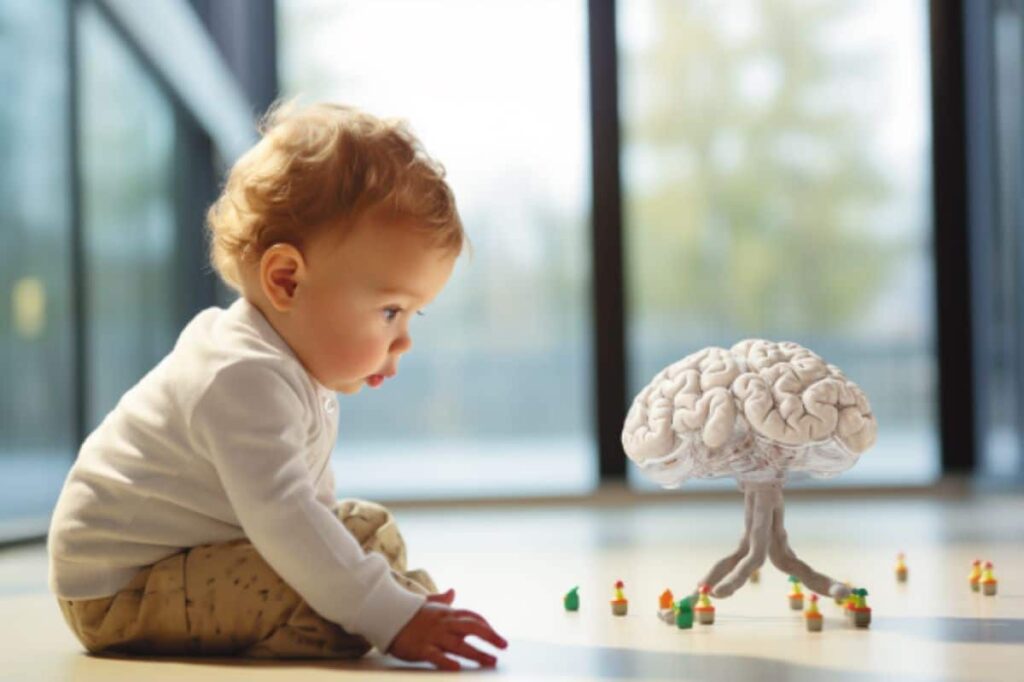Introduction
The first few years of life are a whirlwind of incredible growth and development. As your baby babbles their first words, rolls over for the first time, and explores the world with wide curiosity, you witness the fascinating journey of their brain development. But how can you truly understand what’s happening inside that tiny head? This blog explores the importance of brain development tests for infants, shedding light on their role in assessing cognitive growth and identifying potential developmental delays.The Importance of Brain Development Tests
Brain development has been shown to be most critical immediately after birth and for the first twelve to eighteen months thereafter. Key factors that influence brain development include:- The total quantity of sleep and the REM (Rapid Eye Movement) sleep percentage dedicated to brain function.
- The infant’s varying physiological requirement for sleep based on their age.
- The blood oxygen requirement (‘SpO2’) during REM sleep.
- Eighty-five percent (85%) of a child’s brain develops from birth to four (4) years.
Key Factors Affecting Brain Development
- Total Sleep and REM Sleep: The quantity of sleep and the proportion of REM sleep are crucial for brain function.
- Age-based Sleep Requirements: Infants’ sleep needs vary significantly with age, impacting brain growth.
- Blood Oxygen Levels (SpO2): Adequate oxygen during REM sleep is vital for brain health.
- Early Development: 85% of brain growth occurs from birth to four years, highlighting the need for early assessment and intervention.
Beyond Milestones: A Deeper Look at Brain Development
The term “brain development” may be more accurately defined as “brain function.” Development is a process, not just a manifestation of the brain’s ability to perform tasks. In development are ‘Brain Development Screening Surveys,’ processes that evaluate the conditions necessary for proper brain development. These protocols help identify and correct conditions that may lead to improper brain development. While tracking developmental milestones like rolling over or walking is crucial, it doesn’t provide a complete picture of your baby’s brain development. Brain development tests offer a more comprehensive assessment, focusing on various cognitive skills:- Fine and Gross Motor Skills: These tests evaluate your baby’s ability to control movements, from grasping objects to coordinating larger movements like crawling.
- Language and Communication: These tests assess your baby’s understanding and use of language, including their ability to babble, make sounds, and respond to your voice.
- Problem-Solving and Cognitive Skills: These tests explore your baby’s ability to solve simple problems, learn new things, and show curiosity about their surroundings.
- Social and Emotional Development: These assessments focus on your baby’s social interactions, ability to form attachments, and emotional regulation.
Benefits of Brain Development Tests for Infants
Early detection of any potential delays is key to providing your child with the support they need to thrive. Brain development tests offer several benefits:- Early Identification of Delays: Early detection allows for prompt intervention and treatment plans, maximizing your baby’s potential for catching up.
- Targeted Support: Identifying specific areas of development that might require extra support helps parents and healthcare professionals tailor strategies to address those needs.
- Peace of Mind: For concerned parents, these tests can offer valuable reassurance about their baby’s progress or guide them towards necessary support.
Types of Brain Development Tests for Infants
There are various tests used for infants, depending on the child’s age and specific concerns. Some common examples include:- Denver Developmental Screening Test (DDST): A brief, standardized tool used to assess overall development in young children.
- Bayley Scales of Infant and Toddler Development (Bayley-III): A comprehensive assessment that evaluates cognitive, language, motor, social-emotional, and adaptive behavior skills.
- Head Circumference Measurement: While not a definitive test, rapid head growth can sometimes indicate underlying conditions requiring further evaluation.




